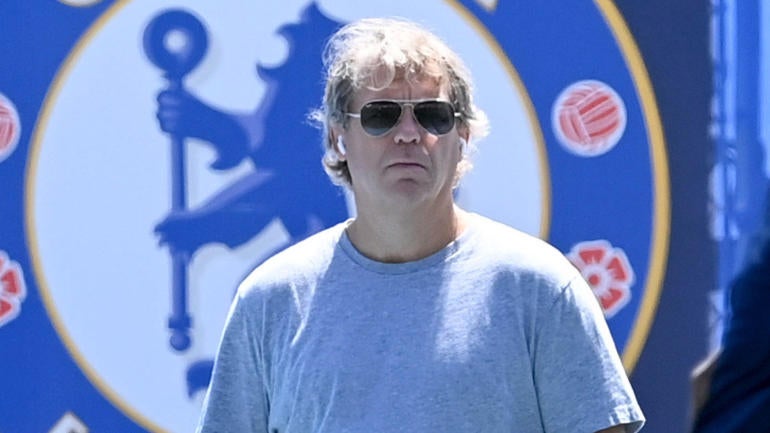
The year is 2029. Graham Potter's vibrant Chelsea side are once more sweeping all ahead of them, swashbuckling in attack but with the defensive instincts that only come through years together on the training ground. Yet another Champions League is seemingly within reach for this side, who, for what feels like a generation, have grown together into a footballing force.
That, perhaps, is the end vision underpinning Chelsea's radical new approach to the management of contracts at Stamford Bridge. In an era of dwindling patience and fast fixes, the Todd Boehly-led consortium that took control last summer are building a squad for the long term, whether they like it or not.

Golazo Starting XI Newsletter
Get your Soccer Fix from Around the Globe
Your ultimate guide to the Beautiful Game as our experts take you beyond the pitch and around the globe with news that matters.
Thanks for signing up!
Keep an eye on your inbox.
Sorry!
There was an error processing your subscription.
Almost every new addition to the squad since the summer has signed deals way beyond the four or five years that most clubs would consider a long-term commitment. Wesley Fofana was one of the first to start the trend, signing a seven-year deal when he arrived from Leicester City. January additions Benoit Badiashile and David Datro Fofana are tied to Chelsea until 2030 (though in the latter's case that includes a 12-month option in his contract) while Mykhailo Mudryk could stick around until 2031 without ever putting pen to paper on fresh terms.
"There is no guarantee anywhere, no magic formula that says this is going to work and this is how we see the future," Potter told reporters earlier this month. "The players we identified are young, they've got quality. With Mudryk and Joao [Felix] coming on loan, there's a certain type of player in terms of age. They are starting their careers so they are ambitious ... They're here to win and compete."
Young players with quality are the sort who have, in the past, received such lengthy commitments from their club. In 2006, Arsenal gave Cesc Fabregas, just 19 at the time but already a first-team regular, eight years, while Tottenham's Harry Kane is on the six-year deal he signed with Tottenham in 2018. It hardly needs saying that they had achieved rather more in the Premier League than Chelsea's January recruits.
These sorts of deals are rather more familiar in Major League Baseball, where Fernando Tatis signed a 14-year deal with the San Diego Padres almost two years ago, and Mookie Betts, 30, has a contract with the Los Angeles Dodgers that will pay him $365 million through the 2032 season. The latter is, of course, significant because a minority owner of the Dodgers, through his stake in Guggenheim Baseball Management, is Boehly. In London, he is the figurehead and he seems determined to disrupt.
Former Miami Marlins president David Samson, host of the CBS Sports podcast "Nothing Personal with David Samson," said Boehly's approach is about being the "person who is in the news" and doing things through a different approach than those before him.
"There's nothing more limiting than being a limited partner, and that's what Todd Boehly is with the Dodgers," said Samson. "He's not the face of the franchise, he doesn't have the ultimate decision-making power within the Dodgers organization. Todd has always had an interest in being the front person. You see with this acquisition that he gets to be the person who is in the news, the focus of a show like this. That is important to any owner. Ego is a big part of sports ownership no matter where you own a team."
To the chagrin of many, Boehly has not been shy about attempting to import ideas that have proven to be successful in American sports. He was laughed out of the discourse for his pitch of a North vs. South Premier League All-Star Game while the sizable front office he has been building – one which includes a technical director, another technical director with a global focus, and two co-director of global talent and transfers – rather has the look of one of the more engorged departments from across the Atlantic.
"What he's trying, and what all owners are trying, is to do things differently from their predecessors when it comes to marketing, sales, team construction," added Samson. "You're trying to leave your imprint on the team so that you can show the fans it's not the same old story.
"The interesting thing about Chelsea is, with their level of success, you want to always surpass the previous owners. You want to be at the top of the table and get there as quickly as possible, applying the lessons you've learned in American sports in the U.K. That's why you're seeing the contracts the way they are. What Boehly learned in baseball is when you sign players to long deals, you get to spread out the money over a longer period of time. That helps your bottom line, your income and cash flow, and, in theory, Financial Fair Play (FFP)."
Chelsea's new spin on contracts must be viewed through the lens of UEFA's regulations. Football clubs amortize the value of a transfer over the length of a contract in their accounts (by contrast, the full value of a sale is booked for that particular year). For instance, while Badiashile's £35 million fee might come with significant sticker shock, spread over the course of his stay at Chelsea, it accounts for a little less than £5 million per season. In such circumstances, it is little wonder that Mudryk was given an eight-year contract, spreading the cost of what might eventually be a £100 million transfer in a more manageable fashion.
Spreading the cost of a multimillion signing over so many years also serves to aid Chelsea in satisfying the financial regulations of both the Premier League and UEFA, though in the latter case, the situation looks set to change. European football's governing body are expected to set a five-year limit over which transfer fees must be paid. That this move has come when Boehly and Co. are so radically deviating from the norm is no coincidence, though UEFA is also said to fear the prospect of more clubs simply kicking the can down the round, building up costs for the next decade.
This month also sees the introduction of UEFA's new financial sustainability regulations, which will eventually limit clubs to spending no more than 70 percent of their revenue on player and coach wages, transfers and agent fees (this will taper down from 90 percent next season, 80 percent in the following year before hitting its target in 2025-26). Whether they are worked around in the same way that clubs might try to find loopholes in FFP (or in the case of Paris Saint-Germain and others, simply pay the fine and carry on regardless) remains to be seen, but there is a clear will at the top of the European game to bring finances in line.
In this regard, Samson gives Boehly credit. Rather than forcing UEFA's hand, Samson judges that the new Chelsea owner saw the tide was coming in and collected as many shells off the beach as possible. If he has merely pushed governing bodies to act sooner then he has exploited a loophole before it was closed off to anyone else.
Whether or not it is a neat accounting trick is only part of the story, however, as Chelsea have committed to employing a lot of young players for a very long time. But what really matters is what this squad develops into. Mudryk's quicksilver cameo against Liverpool on Saturday offered the case in favor, that one of the best young forwards in the game might just have committed his best years to life in West London. At an estimated salary of less than £100,000 a week, if the 22-year-old really hits it is almost akin to having elite production from a quarterback on a rookie scale contract, the holy grail of the NFL.
"Young players are where it's at. You get to pay them to the lowest amount of money and get the most production," said Samson. "In order to win you need as many players as possible outperforming their contracts. If you're overpaying a player because of age or lack of performance, you've got to make up for that by having a younger, cheaper player play better to equal things out."
Naturally, Potter's perspective on the approach of his employers has been rather upbeat.
"If things go well, you have a fantastic asset and the club is secure in terms of the contract length. There's lots of factors. It's a direction the club wants to go down and obviously I am supporting that as best I can," he said.
In theory, it sounds like a home-run move. In practice, the waters Boehly is now swimming in are rather different. If contracts in MLB and the NBA in particular are ironclad commitments, in soccer they are rather more like guidelines. If, for example, PSG were to find themselves taken with Mudryk's performances, Chelsea would certainly be in a better position to ward off interest knowing that he is tied down for the remainder of the decade, but it would be unlikely that they could just stick to the status quo. The history of football has precious few equivalents to Stephen Curry winning the NBA's MVP prize on a grossly under-market contract, a holdover from several years past. Talent gets paid a lot quicker.
That is to say nothing for the risk that Chelsea have merely taken past problems that dogged their squad building in the past. No one believed that the deals handed to Tiemoue Bakayoko and Baba Rahman (both still on the Stamford Bridge books) could have done with additional seasons on them. It is one thing to get eight-year commitments from known quantities such as Fabregas, Kane or Reece James, who re-upped for six years in September. When you are gambling on unproven talent from Ukraine and Norway, is it wise to make such a sizable commitment immediately, particularly when ownership themselves are so untested in these waters?
"What all new owners do, and I call it new owner-itis, is say, 'I'm going to do it differently, I'm going to do it better and everyone's going to want to do it the way I'm doing it, but I will have been first.' They all say it. It never works," Samson said.
If that is indeed the case, then Chelsea could find themselves in a rather different position come the end of this decade, on the hook for players that did not make the grade, a grand experiment having done no more than upped their cost base.






















